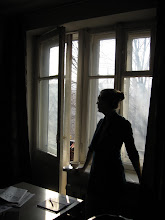
OK, so maybe it's not as dramatic as all that, but folk orchestras are a pretty interesting phenomenon throughout the post-Soviet world - from Bulgaria (Donna Buchanan has written a lot about this) to Kazakhstan (don't hold your breath on anything about it from me, 'cause I personally do not like these groups on principle).
The history of these ensembles is that during the Soviet Union, the officials in charge of cultural policy decided it would be a good idea to create large ensembles of folk instruments in each of the Soviet republics. This accomplished several things: 1) it introduced the Western symphonic orchestra model to many areas where it was previously unknown; 2) it encouraged the Westernization/modernization of many folk instruments so that they looked and sounded more like European classical instruments, and served similar musical functions; 3) these orchestras played re-worked arrangements of folk tunes that often were originally intended for solo or small group performance, but could now be blasted by a big, fat orchestra worthy of the mass-spectacle oriented Soviet public.
All of these above-mentioned reasons point to a common origin: Soviet authorities wanted to turn all peoples in the USSR into slightly folklorized versions of Western Europe, thereby to prove that they were just as culturally accomplished as Europe. Too bad they couldn't have made this point simply on the merits of the original traditional music of these people!
And now, 17 years after the fall of the Soviet Union, we still have folk orchestras in Kazakhstan, Uzbekistan, and several other former Soviet territories. The one pictured here is the Kurmangazy State Academic Orchestra of Folk Instruments, the oldest and probably most well-known of the various folk ensembles in Kazakhstan. They do a lot of touring, including two concerts in the U.S. in 2005 (they were both on the east coast so I couldn't see them). You can read about it here on the Kazakh Embassy website. I just saw them a couple of nights ago because my kobyz teacher did a brief guest solo performance during their program. I will note, however, that the concert hall was far from full, and that a large portion of the audience were young military recruits who clearly were not there of their own volition and started talking loudly toward the end of the concert out of sheer boredom. Actually, I didn't even see the end of the concert because my friend and I left early - seriously, I can only take this stuff for so long. :)
Anyway, I see these groups as a sort of testament to the bombastic cultural engineering of the Soviet Union - although a lot of good composers did some nice arrangements of traditional music for these ensembles, I always feel like it's somehow tainted by a dark legacy of artifice and manipulation. Or maybe I'm just over-dramatizing again.....


No comments:
Post a Comment